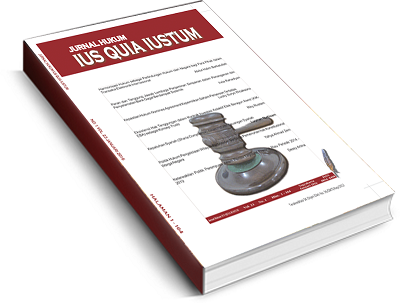Main Article Content
Abstract
Keywords
Article Details
Authors who publish with this journal agree to the following terms:
a. Authors retain copyright and grant the journal right of first publication with the work simultaneously licensed under a Creative Commons Attribution License that allows others to share the work with an acknowledgement of the work's authorship and initial publication in this journal.
b. Authors are able to enter into separate, additional contractual arrangements for the non-exclusive distribution of the journal's published version of the work (e.g., post it to an institutional repository or publish it in a book), with an acknowledgement of its initial publication in this journal.
References
- Buku
- Kaelan, Filsafat Pancasila Pandangan Hidup Bangsa Indonesia, Paradigma, Yogyakarta, 2002.
- Karjoko, Lego, Pembadanan Asas Fungsi Sosial Hak Guna Usaha dalam Pengaaturan Perkebunan yang Mensejahterakan rakyat, Disertasi, Pascasarjana UNS, Surakarta, 2017
- Kartika Rahayu, Muji, Sengketa Mazhab Hukum, Sintesis Berbagai Mazhab dalam Pemikiran Hukum, Penerbit Buku Kompas, Jakarta, 2018.
- Mertokusumo, Sudikno, Penemuan Hukum Suatu Pengantar, Lyberti, Yogyakarta, 2009.
- Mukhlas, Oyo S., Dual Banking System & Penyelesaian Sengekta Ekonomi Syariah, Refika Aditama, Bandung, 2019.
- Nur Rosidah, Zaidah, dkk, Aspek Keadilan Penyelesaian Sengketa Bisnis Syariah Melalui Pengadilan Agama, LP2M IAIN Surakarta, Surakarta, 2016.
- Sulistiyono, Adi, Mengembangkan Paradigma Non-Litigasi di Indonesia, Sebelas Maret University Press, Surakarta, 2006.
- Suadi, Amran, Penyelesaian Sengketa Ekonomi Syariah dalam Teori dan Praktek, Kencana, Depok, 2017.
- ______, Penyelesaian Sengketa Ekonomi Syariah Penemuan dan Kaidah Hukum, Prenada media Group, Jakarta, 2018.
- Jurnal
- Arief Budiman, Achmad, Penemuan Hukum Dalam Putusan Mahkamah Agung Dan Relevansinya Bagi Pengembangan Hukum Islam Indonesia, Al-Ahkam Jurnal Pemikiran Hukum Islam, Volume 24, Nomor 1, April 2014.
- Fatchurohman, Wilda Nugraismia, Tri Wahyuni, Fahmi Medias , Penyelesaian Sengketa Nasabah Wanprestasi Ekonomi Syariah Di Pengadilan Agama Magelang dalam Indonesian Journal of Islamic Literature and Muslim Society, Vol. 3, No. 1, 2018.
- Hariyanto, Erie, Penyelesaian Sengketa Ekonomi Syariah Di Indonesia, dalam Jurnal Iqtish al-Ihkâmadia, Vol 1. Nomor 1, 1 Juni 2014.
- Nurul Musjtari, Dewi , Pembaharuan Hukum dalam Bidang Hukum Ekonomi Syariah, dalam Kanun Jurnal Ilmu Hukum, Vol. 19, Nomor 2 Agustus 2017.
- Setyowati, Ro’fah, Perlindungan ‘Hak Spiritual’ Dalam Penyelesaian Sengketa Perbankan Syariah: Praktik Di Malaysia Dan Indonesia, dalam Jurnal Share, Volume 5, Number 2, July - December 2016.
- Setyowati, Ro’fah, Indah Purbasari, Encik Muhammad Fauzan, Consumers Spiritual Rights in the Islamic Banking Dispute Out of Court Settlement in Indonesia dalam Journal of Social Studies Education Research, 2018:9 (4).
- Internet
- Rasyid, Abdul, Perkembangan Lembaga Perbankan Dan Keuangan Syariah Di Indonesia, https://business-law.binus.ac.id/2018/07/03/perkembangan-lembaga-perbankan-dan-keuangan-syariah-di-indonesia/, diakses 25 Juni 2020.
- https://www.hestanto.web.id/lembaga-keuangan-syariah-lks/, diakses 25 Agustus 2020.
- https://putusan3.mahkamahagung.go.id/direktori/kategori/jenis/ekonomi-syari-ah-1.html, diakses 25 Juni 2020.
- https://www.ojk.go.id/id/kanal/syariah/tentang-syariah/Pages/PBS-dan-Kelembagaan.aspx, diakses 25 Agustus 2020.
References
Buku
Kaelan, Filsafat Pancasila Pandangan Hidup Bangsa Indonesia, Paradigma, Yogyakarta, 2002.
Karjoko, Lego, Pembadanan Asas Fungsi Sosial Hak Guna Usaha dalam Pengaaturan Perkebunan yang Mensejahterakan rakyat, Disertasi, Pascasarjana UNS, Surakarta, 2017
Kartika Rahayu, Muji, Sengketa Mazhab Hukum, Sintesis Berbagai Mazhab dalam Pemikiran Hukum, Penerbit Buku Kompas, Jakarta, 2018.
Mertokusumo, Sudikno, Penemuan Hukum Suatu Pengantar, Lyberti, Yogyakarta, 2009.
Mukhlas, Oyo S., Dual Banking System & Penyelesaian Sengekta Ekonomi Syariah, Refika Aditama, Bandung, 2019.
Nur Rosidah, Zaidah, dkk, Aspek Keadilan Penyelesaian Sengketa Bisnis Syariah Melalui Pengadilan Agama, LP2M IAIN Surakarta, Surakarta, 2016.
Sulistiyono, Adi, Mengembangkan Paradigma Non-Litigasi di Indonesia, Sebelas Maret University Press, Surakarta, 2006.
Suadi, Amran, Penyelesaian Sengketa Ekonomi Syariah dalam Teori dan Praktek, Kencana, Depok, 2017.
______, Penyelesaian Sengketa Ekonomi Syariah Penemuan dan Kaidah Hukum, Prenada media Group, Jakarta, 2018.
Jurnal
Arief Budiman, Achmad, Penemuan Hukum Dalam Putusan Mahkamah Agung Dan Relevansinya Bagi Pengembangan Hukum Islam Indonesia, Al-Ahkam Jurnal Pemikiran Hukum Islam, Volume 24, Nomor 1, April 2014.
Fatchurohman, Wilda Nugraismia, Tri Wahyuni, Fahmi Medias , Penyelesaian Sengketa Nasabah Wanprestasi Ekonomi Syariah Di Pengadilan Agama Magelang dalam Indonesian Journal of Islamic Literature and Muslim Society, Vol. 3, No. 1, 2018.
Hariyanto, Erie, Penyelesaian Sengketa Ekonomi Syariah Di Indonesia, dalam Jurnal Iqtish al-Ihkâmadia, Vol 1. Nomor 1, 1 Juni 2014.
Nurul Musjtari, Dewi , Pembaharuan Hukum dalam Bidang Hukum Ekonomi Syariah, dalam Kanun Jurnal Ilmu Hukum, Vol. 19, Nomor 2 Agustus 2017.
Setyowati, Ro’fah, Perlindungan ‘Hak Spiritual’ Dalam Penyelesaian Sengketa Perbankan Syariah: Praktik Di Malaysia Dan Indonesia, dalam Jurnal Share, Volume 5, Number 2, July - December 2016.
Setyowati, Ro’fah, Indah Purbasari, Encik Muhammad Fauzan, Consumers Spiritual Rights in the Islamic Banking Dispute Out of Court Settlement in Indonesia dalam Journal of Social Studies Education Research, 2018:9 (4).
Internet
Rasyid, Abdul, Perkembangan Lembaga Perbankan Dan Keuangan Syariah Di Indonesia, https://business-law.binus.ac.id/2018/07/03/perkembangan-lembaga-perbankan-dan-keuangan-syariah-di-indonesia/, diakses 25 Juni 2020.
https://www.hestanto.web.id/lembaga-keuangan-syariah-lks/, diakses 25 Agustus 2020.
https://putusan3.mahkamahagung.go.id/direktori/kategori/jenis/ekonomi-syari-ah-1.html, diakses 25 Juni 2020.
https://www.ojk.go.id/id/kanal/syariah/tentang-syariah/Pages/PBS-dan-Kelembagaan.aspx, diakses 25 Agustus 2020.




